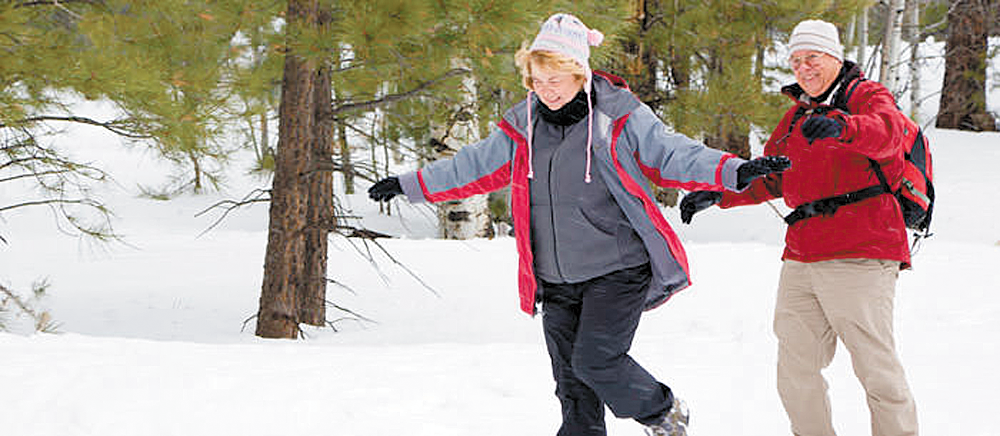December 28, 2015
Winter Safety Tips from CASI – The Center for Active Seniors, Inc.
By: Alzheimer and Dementia Caregivers (www.alz.org)
 As the temperature finally dips into seasonal ranges for winter, those caring someone with Alzheimer’s and other forms of dementia should all be on notice that snow, extreme temperatures and early darkness present special problems.
As the temperature finally dips into seasonal ranges for winter, those caring someone with Alzheimer’s and other forms of dementia should all be on notice that snow, extreme temperatures and early darkness present special problems.
A loved one won’t necessarily dress appropriately for colder weather. Cover as much exposed skin possible and provide several layers of lightweight clothing for easy movement, especially if plans include time outside. A hat is important since so body heat escapes from an uncovered head, and don’t forget to add a scarf cover up an exposed neck. Mittens keep hands warmer than gloves and may be easier to help get on and off. Clips designed for skiers can help keep track of gloves or mittens that are otherwise easily misplaced or lost.
Sundowning term that refers to increased anxiety, confusion and even increased sleepiness due to decreased sunlight in the winter months. Visual perception is already an issue for many people with Alzheimer’s and can cause increased confusion or disorientation in dark or shadowy environments both inside and out. Turn lights on earlier, open curtains during daylight hours and add bulbs that simulate sunlight. Install motion detector lights to help illuminate walkways around the home as darkness may fall before arriving home from an outing. Dressing in light or bright colors or adding reflective material to clothing will help a loved one be more easily seen.
To avoid slips falls, make sure boots are non-skid. There are many boot styles market on the market that use Velcro instead laces to allow the person with dementia some success with dressing themselves. Try separate “tracks” that attach to the soles for added traction on icy surfaces. You can also add a sharp tip to canes for that extra grip on winter days. This device is available at home health care stores.
• Assume ALL surfaces are slick and by taking smaller steps and slowing down, the person with Alzheimer’s can match gait and speed to a safer level.
• Perception problems can make it difficult for the person with Alzheimer’s to see ice on the sidewalk or realize that ice is slippery or that snow is not a solid surface.
• Keep sidewalks and driveways clear of ice and snow to make walking outside safe everyone, but do overuse ice melt products which can reduce traction.
• Use indoor or garage parking whenever possible. Especially on stairs or slick spots, insist handrail use and walk arm in arm when possible.
• Acquire and use a State issued Handicapped placard enabling closer access the door of buildings.
Wandering may be triggered when a person with Alzheimer’s:
• Tries search familiar objects, surroundings they no longer recognize their environment.
• Tries to fulfill former obligations, such going work child.
• Reacts side effects medication restlessness confusion.
• Tries to escape stress caused noise, crowds isolation.
• Is not getting enough physical activity.
• Is fearful of unfamiliar sights, sounds or hallucinations.
• Searches for something specific such as food, drink, the bathroom or companionship.
Never assume that being at home with someone who has Alzheimer’s makes wandering less of an issue. It only takes a moment for someone to leave the house, and the confusion and disorientation that accompany the disease means a friend or loved one can get hopelessly lost in a matter minutes. Having some type of tracking device can provide peace of mind that a loved one could be located within a short period of time after becoming separated.
Medic Alert + Safe Return and Comfort Zone are programs that protect people diagnosed with dementia in case of a medical emergency or a wandering incident. It is not uncommon for a wanderer to require medical attention following an incident. Through the use of a 1-800 number, Medic Alert + Safe Return provides the member’s personal health record including medical conditions, medications and allergies and can be updated 24-hours a day through a private online account or by calling the toll free number during business hours.
To learn more about Medic Alert + Safe Return and Comfort Zone, contact the Greater Iowa Chapter of the Alzheimer’s Association at (563) 324-1022 or visit the Alzheimer’s Association website at www.alz.org.
Filed Under: Health & Wellness
Trackback URL: https://www.50pluslife.com/2015/12/28/winter-safety-tips-from-casi-the-center-for-active-seniors-inc/trackback/


